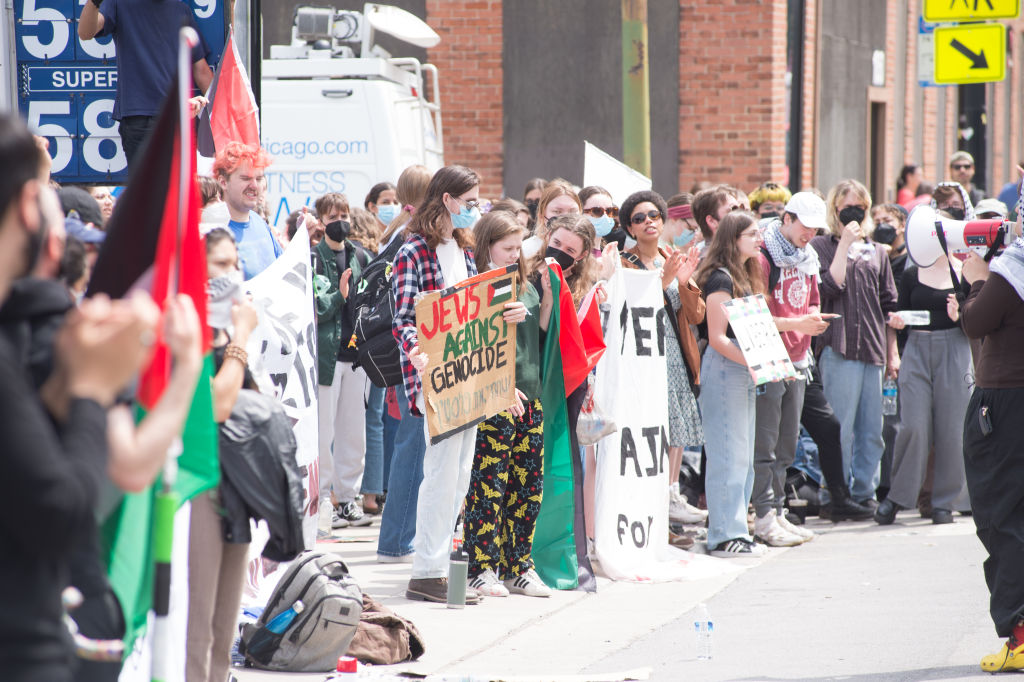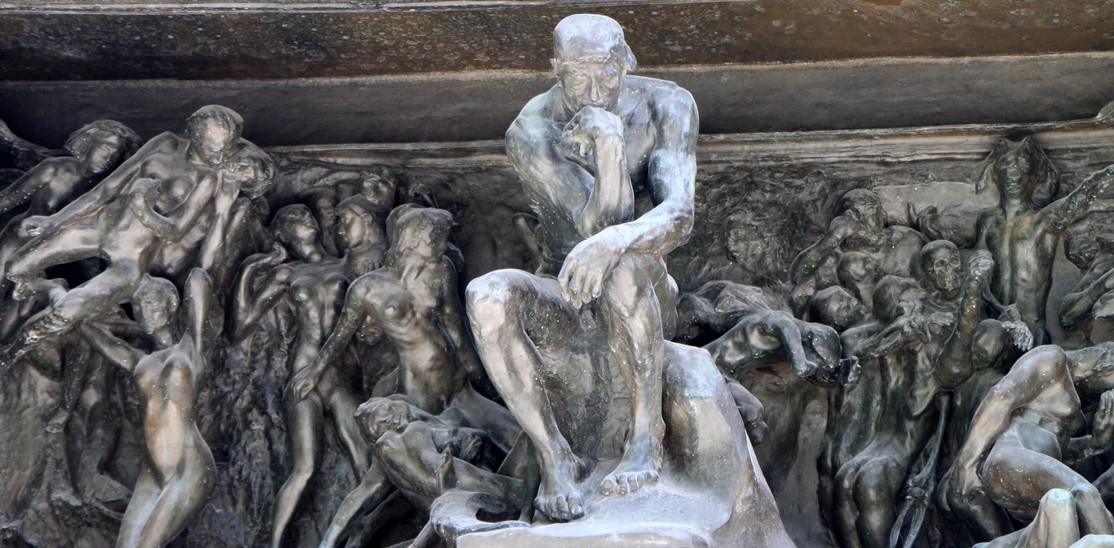Lincoln knew how radical revisionists would try to remake America’s image.
Networks of Malignity

Professional, ideological, and even familial ties connect American institutions in a web of leftist influence.
Regarding the recent anti-Israel protests on campuses, the common perception, especially in media circles, persists that these are spontaneous student uprisings. In fact considerable evidence exists that they are led and financed by lavishly funded activist foundations like George Soros’s Open Society Foundation and the Rockefeller Brothers Foundation; extremist professional protestors, including a 63-year-old woman named Lisa Fithian who tried to block counter protestors to interfere with the pro-Hamas seizure of Columbia’s Hamilton Hall; and wacky nonstudent activists, including a 40-year-old Marxist-anarchist heir to millions named Cody Carlson and Manuel De Los Santos, the leader of the Chinese-funded People’s Forum and a fervent apologist for the Castro regime. De Los Santos hailed Hamas’ October 7 attack as “heroic,” called for Israel to be “erased from history,” and eagerly welcomed the impending “defeat” of the “U.S. empire.”
Lisa Fithian, a disciple of Abbie Hoffman, is a lifelong professional activist for leftist causes, having been described by Mother Jones as America’s “best-known protest consultant.” In her 2019 book Shut It Down: Studies from a Fierce, Loving Resistance, Fithian boasts of having supported countless “movements” during her career.
As a coordinator of the Washington Peace Center in the eighties, Fithian organized hundreds of events and demonstrations on a wide range of issues, including “shutting down the CIA” to protest the assistance that the Reagan administration gave to the anticommunist Contras in Nicaragua. Subsequently, as a leading protest coordinator in the nineties, she organized the massive demonstrations against the World Trade Organization meeting in Seattle. The Seattle protests provided the contemporary model—as seen in the Occupy, BLM, and anti-oil movements—for disrupting the regular political and diplomatic process on behalf of partisan demands reflecting the wishes of a small minority of the population.
Fithian also served as a member of the national steering committee of “United for Peace and Justice,” a national coalition that aimed to end the Iraq war. On the international scene, she also participated in leading “Extinction Rebellion,” the radical environmental movement that employs “nonviolent” tactics like smashing windows and blockading roads and public transportation to awaken the public to the danger of global catastrophe. Lithian also helped to organize the Ferguson, Missouri riots of 2014 which engendered widespread arson, looting, and gunfire, and set the stage for the widespread Antifa-led riots in Seattle, Portland, the Twin Cities, and New York.
A recent demonstration of the reach of the pro-Hamas movement on college campuses was evident in Worcester, Massachusetts, the home of several colleges, including Clark University, long known for its progressive political orientation, but also the home, since 1998, of the Strassler Center for Holocaust and Genocide Studies. The Center describes its mission as studying “the history of genocide, mass atrocities, crimes against humanity and their continuing consequences,” and bills itself as “the first and only institute of its kind.” It portrays its mission as “training students in Holocaust History, the Armenian Genocide, and other genocides perpetrated around the globe.“
On April 14, the longtime director of the Strassler Center, Mary Jane Rein, published a letter in the Wall Street Journal explaining her departure from that position. The departure was precipitated by an email she had received from a senior Clark administrator scolding her for having helped to organize (in her private capacity) a lecture at another local college, Worcester State University. The lecture was sponsored by a WSU history professor, along with the Worcester Jewish Federation, and offered a presentation by an Israeli army reservist who described what he had personally witnessed as an early responder to the October 7 Hamas attack. The intent of bringing in the speaker, as she explained, “was to bring an Israeli perspective to a campus that had hosted anti-Israel events.”
Instead of being the occasion for promoting an informed exchange of perspectives among Worcester college students, as Rein reported, the speaker was “repeatedly interrupted” by hecklers who stood up to make statements of their own, ring their cell phones, and even pull a fire alarm, requiring the auditorium to be evacuated for 20 minutes.
Rein was also the target of an attack by three graduate students from the Strassler Center whom she knew personally. When she was called on to introduce the speaker, one of the students shouted to her not to use her title, as her views (of which she had made no statement) were unrepresentative of the Center. The Center, as it happens, is apolitical other than that its opposition to genocide. After the lecture, the same student identified herself as a specialist in the study of genocide at the Strassler Center, and proceeded to accuse Israel of genocide in Gaza. She and other Clark students demanded that Rein resign from her position.
The next day, Rein was admonished that her appearance at the event was “highly problematic,” though her affiliation to Clark was not mentioned at the lecture. The administrator acknowledged that Clark faculty, drawing on their “research and expertise,” have the right to speak freely on public issues, but explained that for an administrator like Rein to mention her affiliation to Clark would cause public confusion. Rein concluded that she was being subject to censorship on account of her Jewish identity and support for Israel, and that the terms of her employment would be in question if she further violated the official’s “guidance.”
Curiously, the president of Clark University since 2020 has been David Fithian – the brother of professional radical organizer Lisa Fithian. In a response to Rein’s column, after expressing appreciation for her twenty years of service to Clark, Fithian explained that “the guidance she received was meant not to limit speech, but to clarify, going forward, if she was speaking in her capacity as executive director of the Strassler Center.” But as director of the Center, her affiliation with it and Clark University could easily be imputed at any event.
In her Journal column, Rein announced that she was resigning from Clark to take on a position at Assumption University, a lesser-known Worcester institution, as the first director of its newly established Center for Civic Friendship. That program, she confidently (and justifiably) observed, constituted “a different cause” from the one that had compelled her to leave Clark, “one rooted in respect, honest inquiry and the free exchange of ideas in the context of civic friendship.”
To her “surprise,” Rein remarked, “as both a scholar and a Jew, I feel a warmer welcome and more commonality of purpose at a Catholic institution than at Clark, a secular one.” She found “common cause with Assumption … in its mission to pursue truth in the company of friends.” The school’s “commitment to a style of learning that acknowledges and respects different opinions,” she remarked, renewed her “hope that universities can lead us toward a better future.”
In fact, there is every reason to believe that Rein’s hope, at least regarding Assumption, will prove justified. Although less known than its local Catholic counterpart, College of the Holy Cross (where I taught for 47 years), Assumption has long had, alongside its vocationally oriented departments, a strong commitment to genuine liberal education, based partly on the study of the great works of Western civilization. Its departments of politics, philosophy, and religion are particularly distinguished. And its president, Greg Weiner, is not only a highly accomplished political scientist (the author of four books), but the first Jewish president of any Catholic college in America.
In a recent Wall Street Journal column of his own, Weiner urged Jewish parents and students who were appalled by the anti-Israeli and anti-Semitic atmosphere that has become widespread on American campuses to give serious consideration to a (carefully chosen) Catholic college, where they might find greater respect for their partly shared Biblical heritage, as well as for genuine academic freedom. The road to reforming America’s thoroughly corrupted academic institutions is likely to start at lesser-known schools with a serious commitment to free inquiry and liberal education rooted in the great books, like Assumption, the University of Florida, Hillsdale College, and the newly established University of Austin.
The American Mind presents a range of perspectives. Views are writers’ own and do not necessarily represent those of The Claremont Institute.
The American Mind is a publication of the Claremont Institute, a non-profit 501(c)(3) organization, dedicated to restoring the principles of the American Founding to their rightful, preeminent authority in our national life. Interested in supporting our work? Gifts to the Claremont Institute are tax-deductible.
Academics speak out against the threat of censorship.
Harvard's affirmative action case offers a crucial opening.



